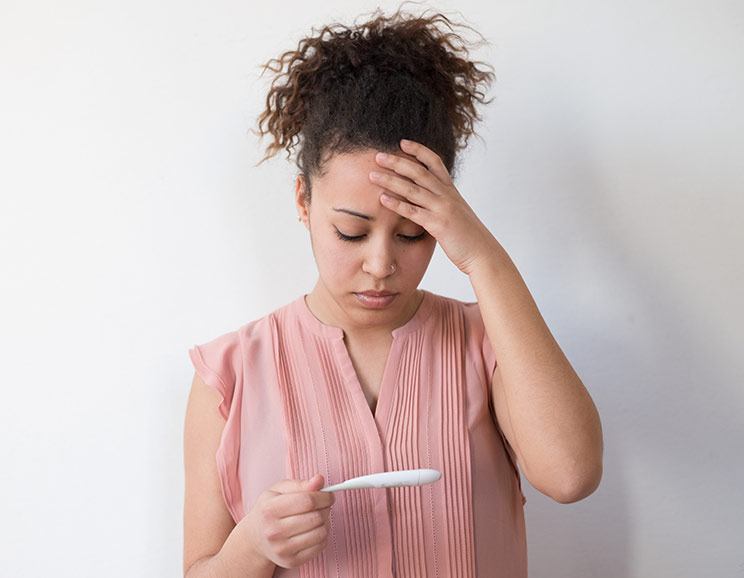If you’re experiencing thyroid problems, it’s possible that your hormonal birth control could be a contributing factor. Here’s why.
Taking a daily pill or getting an injection might seem like the perfect way to prevent pregnancy, but messing with your body’s natural hormones has its consequences.
Unfortunately, the thyroid is often affected when you take hormonal birth control, and these problems can long outlast reproductive years. The good news is that there are ways to protect the thyroid and prevent pregnancy. But before that, let’s just briefly examine the thyroid’s role in your body.
Are you struggling with a Thyroid condition? We’ve created a FREE guide that shows you how you can heal your thyroid.
Click here to get your FREE copy of our Thyroid Guide!
Symptoms of Thyroid Issues

The thyroid is a butterfly-shaped organ near your throat. It’s responsible for making hormones that regulate your metabolism, energy levels, and it also tied to sex hormones. In women, this means estrogen, progesterone, and smaller amounts of testosterone.
Problems can arise if your thyroid isn’t producing enough hormones. Here are some of the most common symptoms of low thyroid function: (1)
- Fatigue
- Insomnia
- Sensitivity to cold
- Constipation
- Dry skin
- Unexplained weight gain
- Puffy face
- Hoarse voice
- Muscle weakness, aches, tenderness
- Stiff joints
- High LDL cholesterol
- Heavy periods
- Thinning hair
- Decreased heart rate
- Poor memory
- Depression
- Anxiety
- Goiter
Birth Control and Your Thyroid
Thyroid issues and symptoms of birth control hormone changes have a lot of overlapping factors.
Period Problems
If you started birth control to address heavy or painful periods, this may be an indicator that you had a thyroid problem from the start. Oral contraceptives are often thought to be the solution to heavy periods since they prevent ovulation and produce much lighter (or stopped) periods. The problem with this approach is that ovulation needs to occur in order for the body to produce progesterone, the hormone that tempers estrogen’s strong effects.
Ovulation isn’t something you can just turn off and then turn right back on.
Thyroid imbalances themselves can also prevent ovulation. (2) While this might seem like a good thing if you don’t want to get pregnant, you could be facing a significant problem if you ever do decide that you want to conceive. Ovulation isn’t something you can just turn off and then turn right back on. Many women coming off birth control can take up to a year to restore normal periods, and if you also have an underlying thyroid issue that existed before birth control or was worsened by it, it could take even longer.
Estrogen Imbalance
Birth control stops or interferes with ovulation since that’s how you can get pregnant. However, when ovulation stops, your ovaries stop producing progesterone, leading to high levels of unbalanced estrogen. Even if the birth control you are using does not contain estrogen, other synthetic hormones can still result in estrogen dominant symptoms. Estrogen dominance also increases the odds of having thyroid problems, since progesterone is protective of all endocrine organs, including the thyroid. (3)
Symptoms of too much estrogen or an unbalanced relationship between estrogen and progesterone include: (4, 5)
- Bloating
- Tender breasts
- Irregular menstrual periods
- Heavy periods
- Severe PMS or mood swings
- Anxiety
- Depression
- Headaches
- Weight gain or inability to lose weight
- Insomnia
- Hair loss
- Cold hands or feet
- Memory and cognition problems
- Fatigue
Note that many symptoms of thyroid problems and high estrogen overlap, and can tend to worsen each other in a never-ending cycle of hormone chaos.
Alternatives to Hormonal Birth Control
The best way to restore balance in your body is to quit hormonal birth control or anything that stops ovulation. It’s important to know that ovulation isn’t just a vehicle for pregnancy; it is also an important health marker, referred to by some as a woman’s fifth vital sign. (6) When you’re missing the information that this fifth vital sign presents due to artificial suppression from birth control, you also miss out on the other aspects of health and disease it can tell you about: how healthy your ovaries are, your overall hormone wellness, and your fertility.
The good news is that it’s possible to prevent pregnancy without using hormonal birth control. While some might feel it’s more work to utilize these methods, others find that ditching side effects of birth control, gaining an ovulatory health marker, and shifting the burden of contraception onto both partners instead of just the female helps to promote positive benefits all around.
Condoms
Condoms are 98 percent effective when used correctly. (7) To avoid incorrect use, do not use coconut oil or other oil-based lubricants, as they can break down rubber condoms. Stick with a water-based lubricant instead.
Fertility apps
You can also use your smartphone as part of your birth control. While there are a few good fertility tracking apps out there, the FDA officially approves Natural Cycles as an official method of birth control. It is 99 percent effective with perfect use and 93 percent effective with typical use – meaning that statistically, it beats condoms for a successful way of avoiding pregnancy. (8) This app requires taking your temperature each morning on waking and costs approximately $80/year.
Ultimately, if you’re committed to quitting hormonal birth control, your best chance of success is pairing a fertility tracking app or device with condom use, especially on or around your fertile window.
Beyond Natural Cycles, there are many other apps which offer the same benefits and are less expensive. My favorite is Fertility Friend, which offers both free and premium versions. Daysy is another doctor-endorsed method of fertility tracking that will show fertile or safe days right on the device.
Wearable fertility tracking devices
If you’re not keen on having to take your temperature each morning, try a wearable device like the Ava bracelet, which you simply wear while you sleep. Ava is also an FDA-registered medical device and can identify the five days each month where you’re likely to get pregnant with 89 percent accuracy. (9, 10)
Ultimately, if you’re committed to quitting hormonal birth control, your best chance of success is pairing a fertility tracking app or device with condom use, especially on or around your fertile window. To be extra cautious, practice abstinence six days before your predicted ovulation and two days after.
4 Ways to Address Thyroid Problems If You Can’t Quit Birth Control

While quitting the pill is your best bet, there are some circumstances where you just cannot quit hormonal birth control. So what can you do? Here are a few lifestyle changes you can make, or supplements that might help. Remember, always speak to your doctor before starting any new supplement.
Support gut health
Birth control leads to serious disruptions in the microbiome and can result in candida overgrowth or other gut problems. (11, 12) Support your gut while on birth control by regularly eating probiotic-rich foods like sauerkraut and kimchi, and consider taking a daily probiotic supplement.
Replace depleted nutrients
Birth control is associated with nutrient depletion, specifically with folic acid, B2, B6, B12, vitamins C and E, magnesium, zinc, and selenium. (13) Deficiency or depletion of these nutrients can result in mood disorders like anxiety and depression, as well as more thyroid problems since it requires selenium to make hormones. (14, 15) Boost these vital nutrients by eating more fresh fruits and vegetables, grass-fed animal products, pasture-raised eggs, nuts, and seeds.
Address mental health
If you’re dealing with anxiety and depression while taking birth control, some supplements can help ease symptoms. Try taking l-theanine, an amino acid that can help to calm a racing mind, and curcumin, which can help to decrease depression. (16, 17) Additionally, yoga, acupuncture, meditation, spending time in nature, or engaging in therapy can help to support mental health.
Balance insulin and glucose
Birth control hormones can promote insulin resistance, which is why it’s often associated with weight gain and an inability to lose weight even when you eat a great diet. (18) To help fight against insulin and glucose imbalances, consider supplementing with berberine or chromium. (Note: berberine is not safe for pregnant women.)
Bottom Line
There are only a handful of days each month when a woman can get pregnant, and yet women are suppressing their hormones and experiencing the side effects and thyroid problems 100 percent of the time. Fortunately, there are lots of viable alternatives to hormonal birth control that can help women avoid complications and enhance overall health.
(Read This Next: Paleo and Hormone Balancing)


 Buffalo Wing Cashews
Buffalo Wing Cashews









Show Comments